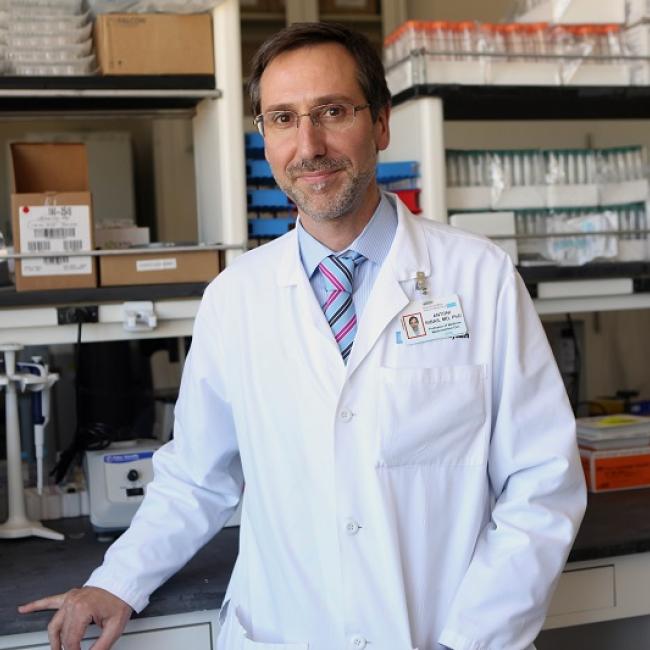Research Focus: Updates From the Clinic
Dr. Antoni Ribas can see a day when metastatic melanoma, an aggressive and terminal form of skin cancer, becomes a manageable or curable disease. His exciting research at the UCLA Broad Stem Cell Research Center and the Jonsson Comprehensive Cancer Center is on the leading edge of scientific discoveries that bring this goal ever closer.
Ribas came to UCLA in 1996 from Barcelona, Spain, to pursue an understanding of the human immune system in relation to cancer that would make it possible to engineer the body’s own defense mechanisms to attack cancerous tumors. He is primarily focused on approaches for alerting white blood cells in the body’s immune system (called T lymphocytes or T cells) to the presence of cancer, leading the T cells to attack the cancer, especially in patients with melanoma.
Translational Research: Laboratory to the Bedside
A physician and scientist, Dr. Ribas translates scientific discoveries into real treatments for devastating diseases. When he began his research, cancer seemed invisible to the human immune system, thus the body created no immune cells (called antibodies) to fight it. “We’ve gone from simplistic views of how to stimulate the immune system,” he said, “to very elaborate approaches that are based on a deeper understanding of how the immune system is regulated and how we can harness it to attack cancer.”
As a medical oncologist, Dr. Ribas treats patients with melanoma, especially melanoma that has spread beyond the initial site of disease (metastatic melanoma). His laboratory looks for multiple approaches to trigger the immune system to create armies of T cells and other immune cells that will identify melanoma and attack it.
Stem Cells, Cellular Therapeutics, & Clinical Trials
With a New Faculty Award from the California Institute of Regenerative Medicine (CIRM), Dr. Ribas initiated a clinical trial for end-stage melanoma patients in which T cells were taken from patients’ own peripheral blood and genetically engineered to become specific melanoma killing cells.
The clinical trial demonstrated proof-of-principle that the genetically modified T cells can promote a genuine immune response to melanoma. The project uses patient-specific, genetically modified T cells that when given back to the patient, specifically attack the patient’s tumors. The trial demonstrated that the treatment shrunk tumors dramatically in most of the patients, but the positive effects were short-lived. The short term effects of this technique led Dr. Ribas and his collaborators to ask how they can develop long lasting self-sustaining cancer killing T cells to combat the disease.
To achieve his translational research goals, Dr. Ribas leads a multi-institutional and multi-disciplinary team called the Translational Consortium in Engineered Immunity. The team includes UCLA faculty, such as Vice Chancellor James Economou, stem cell center director Owen Witte, and gene medicine director Donald Kohn as well as scientists from the California Institute of Technology, University of Southern California, University of Connecticut, and Indiana University. This robust collaborative effort drives the research to new breakthroughs including the recent nanotechnology advancement that allowed the team to monitor individual engineered T cells to help discover why the cells lose their tumor killing ability over time.
The next stage of the project is scheduled to begin a clinical trial in two years funded by a CIRM-sponsored Disease Team award. Dr. Ribas will utilize the potential of stem cell technology to achieve a longer lasting treatment. Stem cells have the unique ability to self-renew. Dr. Ribas and his team will genetically engineer blood stem cells to provide a self-renewing source of cancer-fighting immune cells. He hypothesizes that modifying the blood stem cells will allow the patient to continuously generate immune cells that will target and kill the cancer.
The Future
Dr. Ribas sees a broad goal of genetically reprogramming the human immune system to generate a balanced, predictable and programmed population of T cells that can recognize and fight specifically targeted cells in patients with cancer and infectious diseases.
“Through the stem cell center, I have gained the support of outstanding basic scientists interested in helping me move preclinical stem cell science to the bedside.” “My goal, to become a stem-cell-based physician-scientist, has been made reachable by the mentoring I have received from stem cell center leadership, the interactions I have had with stem cell biologists, and the formal training in embryonic stem cell research I have received at the center. The UCLA Broad Stem Cell Research Center has allowed me to pursue the clinical testing of stem cell-based genetic engineering of the immune system that I believe will lead to an effective treatment for metastatic melanoma and other deadly diseases.”
